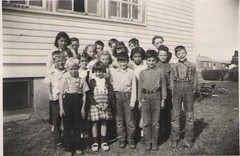Andy Suknaski, award winning poet and visual artist, has passed away at age 69.

–Photo sent to me by Dale Caragata. Andy is front-center.
Andy was from my home town of Wood Mountain, and I have some memories of him as I grew up. He lived only a block away (not big odds on that, when the village is only five blocks in any direction), and the two not very notable memories I have of him are him working in his backyard on some yard work, maybe chopping caragana branches back to prevent overgrowth, and of him visiting with my parents and Bob Shields in Bob’s backyard. I was later vaguely aware of Andy’s relative fame, and am realizing he may not yet be included on the village website or Wikipedia entry, which is something I’ll have to correct. I recall a documentary about him appearing on CBC, and my Mom being somewhat unimpressed by their depiction of him. During his last years he was not particularly well, and it prevented him from writing more.
From the UCC website:
One of the most acclaimed Canadian poets of the second half of the 20th century, and a visual artist Andrew Suknaski was born in 1942 on a homestead near Wood Mountain, Saskatchewan in July 1942 to Julia (Karasinski) and Andrew Suknaski, Sr. He was educated at the Kootenay School of Art, the University of Victoria, Montreal Museum of Fine Arts School of Art and Design and Simon Fraser University. He has worked at a variety of jobs from farmhand to night watchman to managing a portable one-man publishing venture that specialized in limited edition mail-outs.
Suknaski’s narrative style was the dominant influence on the Canadian Prairie poetry in the 1970s and 1980s. His published works include The Ghosts Call you Poor (1978), East of Myloona (1979), In the Name of Narid (1981), The Land They Gave Away (1982) Silk Trail (1985). His works are included in the anthologies Canadian Literature in the 70s and The Oxford Book of Canadian Verse in English.
In 1979, Suknaski won the Canadian Authors Association Poetry Award for The Ghosts You Call Poor. He has been the subject of a great amount of critical attention, including articles by Jars Balan, “Voices from the Canadian Steppes: Ukrainian Elements in Andrew Suknaski’s Poetry.” Studia Ucrainica (1988), Dawn Morgan’s, “Andrew Suknaski’s ‘Wood mountain time’ and the chronotope of multiculturalism.” Mosaic (1996) and Tatiana Nazarenko’s “Ukrainian-Canadian visual poetry: traditions and innovations.” Canadian Ethnic Studies (1996).
In 1978, the National Film Board of Canada made a documentary film on Andrew Suknaski entitled Wood Mountain Poems. In it, Suknaski talks about his part of the world, about its multicultural background, its Indian heritage, and the customs and stories of its different ethnic groups. In June of 2000, the BRAVO! channel aired a 30-minute interview with Suknaski.
In 2006 Wood Mountain Poems, was republished in a 30th Anniversary edition by Hagios Press. A launch at the Festival of Words in Moose Jaw attracted a large audience. Suknaski’s Polish and Ukrainian heritage, his concern for First Nations and the people and place featured strongly in his realist poetry and his work continues to influence poets and writers and is studied across Canada.
Suknaski has stated in an interview with the Saskatoon Star-Phoenix that, “My central concern is documenting the West, where people come from, who they are in terms of myth and spiritual belief.” In his poetry, Suknaski is caught up in the past, in the loneliness of the vast plains, and in making that experience live on to become a part of the present as well.
Grain Elevator, which Andy worked on, is one of my favourite NFB films and I like to think it would be even if it wasn’t made two blocks from where I grew up.
ADDED: Audio from CBC Blue Sky interview about Andy’s life.

Pingback: Death of a Poet :: PJ Reece